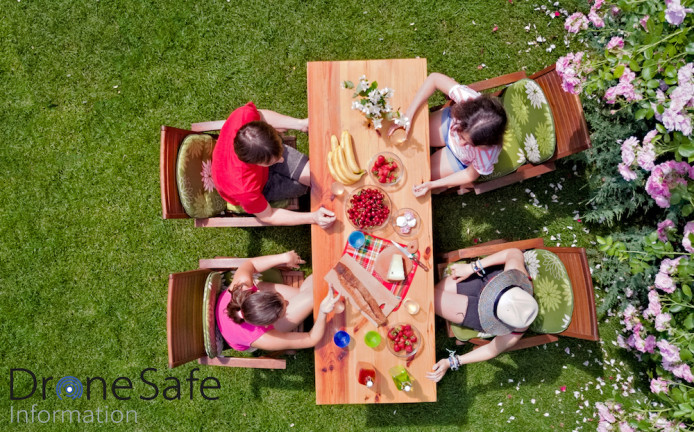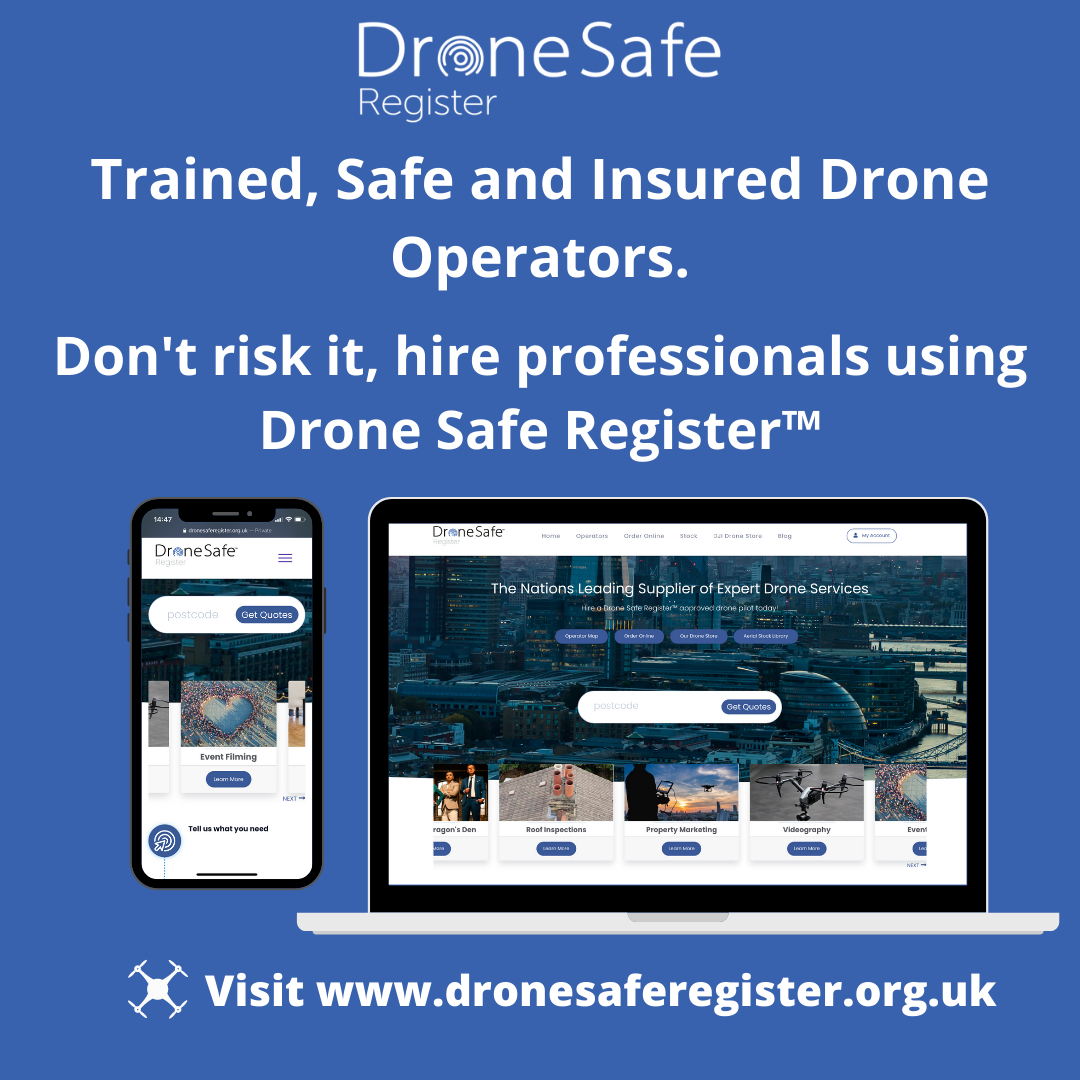
Drone Operators Are At Risk This Summer - Where Can I Legally Fly a Drone in The UK?
Drone Safe Register™ CEO and Founder, Mark Boyt, predicts that the industry would be at ‘boiling point’ by summer if it wasn’t for the increased enforcement campaign set out by the NPCC (the National Police Chief’s Council), the Home Office, the Department for Transport and the CAA (Civil Aviation Authority).
The CAA and NPCC have joined forces with the Home Office and the Department for Transport to act on drone crime, launching ‘Operation Foreverwing’ on the 22nd of March following a huge 330+ reports of drone misuse in just 5 months.
The rise in drone crime comes at a time in which lines have been blurred in the industry following new regulations (brought in on the 31st December 2020) reflecting a more risk-based approach. As enforcement within the Open Category lies with the police, this is likely to stretch their resources.
Drone technology is growing increasingly popular among new audiences and without the correct education at the point of sale, many are finding it difficult to understand what is and what is not acceptable.
At Drone Safe Register™ we pride ourselves on maintaining a trained, safe and insured industry of responsible professionals and hobbyists of which we have a team on hand to support five days a week. We also offer additional support with any purchase of a drone from our Drone Safe Store, by providing a free 1-hour telephone consultation.

With a predicted 200,000+ drone operators (both hobbyist and commercially operating) in the UK, we feel that it is imperative to increase educational awareness of what is and is not acceptable when it comes to flying a drone within the UK regulations.
Over the period of the third Lockdown, in particular, we have received an influx of enquiries about identifying drone misuse and how and where to report this.
The biggest challenge lies with the introduction of new regulations that allow individuals more freedom in flights, with smaller drones that are now widely available on retailers, such as, Amazon that offer little to no guidance on the correct regulations that should be followed to prevent issues from arising.
The main issues with this; aside from the injuries a drone could cause in the hands of those not using them responsibly, is the impact this change could have on the public's perception of drones, of which for the most part is full of smart, passionate and considerate drone enthusiasts.
'Operation Foreverwing’ will seemingly allow the UK authorities to clamp down on drone crime by enforcing fines and in some cases enabling on-site confiscations.

In addition to the increased enforcement, there will be an increase in educational activities rolled out by the CAA to encourage understanding and awareness of safe and legal drone operations.
Jonathan Nicholson, Assistant Director of Communications, CAA confirmed:
“‘For a number of years, we’ve been running a far-reaching educational campaign aimed at explaining the UK’s drone rules and how drone users can fly safely. The aim of this work has always been to encourage people to use and fly drones but to do so safely and responsibly.”
The CAA has confirmed that as a result of numerous education-focused campaigns the yearly National Drone Survey demonstrated an increase in awareness of the DroneCode from 20% to a huge 70% (50% increase).
Although this is a great increase in awareness, the CAA recognises that there is still more to do and establish they will continue with the ongoing project for years to come.
Jonathan continues: “We were also aware that a lot of drone users, especially those that have gained approvals (and) permissions etc wanted to see more action taken to promote enforcement of the rules.”
Further, confirming: “The agencies involved haven’t been as coordinated as they could be in how they talk about enforcement...This (Operation Foreverwing) aims to highlight the enforcement that does take place in the UK, how that happens and what the consequences may be if you break the drone rules. We’ll also be providing toolkits and materials to police forces and other agencies so that we can all talk about the same messages and jointly have case studies and examples of enforcement to share. When enforcement does happen we will also look to be more proactive in telling people about it.”
We have worked with our training partners, Osprey Drone Training, to outline the regulations as presented on the CAA’s website, to ensure the messages set out are as clear as possible surrounding what is deemed a responsible course of action whilst flying a drone.
Where you can fly -
You must fly below 120m (400ft). If you fly where the ground rises or falls (such as hills or mountains) you may need to adjust your flight path to ensure you do not exceed 120m height. Consider this like having a piece of string dangling from the drone, the string should touch the earth at all times.
Depending on which category you are flying in, different rules will apply for the weight of each drone. Please see CAP 2012 link for information about flying in the open category.
If you want to fly within the Specific Category, then you must abide by the terms of your Operational Authorisation, issued by the CAA. To obtain this, you need to have completed a course with a recognised assessment entity and hold valid proof of pilot competency.
Where not to fly -
Do not fly closer than 50m of uninvolved people (please see changes in rules dependent on drone weight in the below section).
You must keep a 50m horizontal distance between your UAS (drone) and uninvolved people (people that are not with you/aware of what you are doing). You must not fly over uninvolved people, even if you’re flying higher than 50m (unless this is in conjunction with your Operational Authorisation and a safe flight can be made).
Never fly over people who are crowded together, such as, shopping areas, sports events, religious gatherings, political gatherings, music festivals and concerts, marches and rallies, at a crowded beach or park, parties, carnivals and fêtes.
Never fly in or near Flight Restriction Zones (FRZs).
You must keep at least 150m away from residential, recreational, commercial and industrial areas (different rules apply for flights with sub 250g, C0 and C1 class drones, see below section).
If you are flying a small drone (sub 250g, C0 or C1 class) the rules for minimum distances and where you are able to fly your drone are different.
You may fly closer than 50m to uninvolved people and you may fly over them (avoid where possible, you must not fly over crowds) if you are flying a sub 250g, C0 or C1 class drone.
HOWEVER, the CAA encourages you to think about what you’re doing and extenuating factors that may increase your risk of danger to people when flying closer to them. For example, poor weather conditions and flight speeds may affect the control of your drone.
The CAA also suggest that where possible you should keep the same distance from people horizontally as you are vertical, to ensure that you are minimising danger.
You can fly small drones (sub 250g, C0 or C1 class drones) in residential, recreational, commercial and industrial areas, however, we would encourage you to remember that you must always fly safely and be conscious of other peoples privacy and personal space.
(There are not currently any C class drones on the market, and the regulations are relying on transitional 'legacy' drones that were placed on the market before January 2023)

What to do if you’re concerned about the use of a drone -
The CAA has confirmed “The Police remain the prime enforcement agency for the drone rules in the UK. So in the first instance, people should report suspected drone misuse to the Police. This is especially the case if they think a crime is being committed or people, property and safety are being endangered.”
Should you have any concerns regarding the safety or privacy perspective of a drone, you should contact the police using 101.

Flying your drone outside of the above-mentioned regulations requires the correct authorisations from the CAA.
For example, if you wish to fly at different heights to those mentioned above, closer to buildings and/or people and properties, or over crowds you’ll need to obtain the relevant permissions. To learn more about authorisations, follow the link.
FAQ -
What does this change in regulations mean for business owners?
Hiring a trained, safe and insured drone pilot is always your best option when looking to obtain aerial data. Our nationwide network of some of the best drone operators in the industry has a number of years of experience in several fields of data collection, in addition to holding verified permissions with the CAA and the relevant insurance.
What does this mean for event safety?
The changes in drone regulations (relative particularly to the weight of the aircraft) will no doubt have an effect on event safety regulations and hazard reports.
As mentioned above, we would suggest that hiring a trained professional; particularly where there is an increased danger because of proximity restrictions, is always the best option. Customers can find and hire drone operators without agency fees or commissions, using our free instant quote system.
What does this mean for people in recreational areas?
Recreational areas are now accessible by drone (sub 250g, C0 or C1 drones - AND those flying within the Specific Category), however, if at any point you have reason to believe that a crime is being committed or people, property and safety are being endangered, you should call the police on 101.
What does this change in regulations mean for you in your home/on private property?
You have the right to privacy in your home/private property. Although drones (sub 250g C0 or C1 only) are legally entitled under the current regulations to fly in residential, recreational, commercial and industrial areas if you suspect a drone is being misused to obtain unlawful or particularly obtrusive data you should report it to the police on 101.


